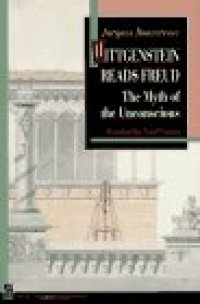
Ebook: Wittgenstein Reads Freud
Author: Jacques Bouveresse
- Year: 1995
- Publisher: Princeton University Press
- Edition: 1st Edition in English
- Language: French
- pdf
A debate continues to rage in French academic circles as to psychoanalysis being a proper science of mind or merely a theoretical construct, a philosophical theory, simply another approach to viewing and interpreting the mind.
Jacques Lacan, for example, has exalted psychoanalysis to the status of a "meta-science" affecting all of the humanities, and claims that philosophy is in current need of psychoanalytic "science" in order to legitimize it as a relevant subject of the humanities.
Be that as it may, however, those somewhat acquainted with Wittgenstein's thought, realize that he proposed that we are limited by language; that the so-called "scientist" must restrain his/her impulse to say more than they actually know.
Wittgenstein believed Freud to be an extraordinary individual, though, in a letter to Norman Malcolm, he wrote, "Of course, (he) is full of fishy thinking & his charm & the charm of his subject is so great that you may be easily fooled." Freud believed himself to be a biological determinist, and argued that psychoanalysis was in fact a authentic science, and used persuasive and clever forms of reasoning to "prove" the existence, for example, of the unconscious, and its alleged predictable, measurable and ultimately, mechanical processes.
Wittgenstein proposed that psychoanalysis does not have much to do with science, but is really another form of representation, though a highly seductive one.
I found this to be a well-translated and well-written essay analysing the central issues in Freud's arguments and using Wittgenstein's scattered conversations about Freud to back the counter arguments. Bouveresse tackles the Reason and Cause arguments; the `Generalizing Impulse" in regards to justifying a theory; and Freud's method of dream interpretation, and shows it fails on many counts when analysed against the rigours of falsification and verification.
Although Wittgenstein views the tenets of psychoanalysis as "a manner of speaking" and not a valid science, he maintains Freud's power of persuasion and the originality of his thought. In the end, however, psychoanalysis is about persuasion, telling the analysand that such and such a thing is the "cause" of their particular malady, and influencing them to accept that diagnosis. These "explanations" have a particular charm for the analysand, whether they're actually the case or not.
This was an interesting discussion on Freud's theories and Wittgenstein's arguments against them. As a result, I have a better understanding of Freud and Wittgenstein.
Jacques Lacan, for example, has exalted psychoanalysis to the status of a "meta-science" affecting all of the humanities, and claims that philosophy is in current need of psychoanalytic "science" in order to legitimize it as a relevant subject of the humanities.
Be that as it may, however, those somewhat acquainted with Wittgenstein's thought, realize that he proposed that we are limited by language; that the so-called "scientist" must restrain his/her impulse to say more than they actually know.
Wittgenstein believed Freud to be an extraordinary individual, though, in a letter to Norman Malcolm, he wrote, "Of course, (he) is full of fishy thinking & his charm & the charm of his subject is so great that you may be easily fooled." Freud believed himself to be a biological determinist, and argued that psychoanalysis was in fact a authentic science, and used persuasive and clever forms of reasoning to "prove" the existence, for example, of the unconscious, and its alleged predictable, measurable and ultimately, mechanical processes.
Wittgenstein proposed that psychoanalysis does not have much to do with science, but is really another form of representation, though a highly seductive one.
I found this to be a well-translated and well-written essay analysing the central issues in Freud's arguments and using Wittgenstein's scattered conversations about Freud to back the counter arguments. Bouveresse tackles the Reason and Cause arguments; the `Generalizing Impulse" in regards to justifying a theory; and Freud's method of dream interpretation, and shows it fails on many counts when analysed against the rigours of falsification and verification.
Although Wittgenstein views the tenets of psychoanalysis as "a manner of speaking" and not a valid science, he maintains Freud's power of persuasion and the originality of his thought. In the end, however, psychoanalysis is about persuasion, telling the analysand that such and such a thing is the "cause" of their particular malady, and influencing them to accept that diagnosis. These "explanations" have a particular charm for the analysand, whether they're actually the case or not.
This was an interesting discussion on Freud's theories and Wittgenstein's arguments against them. As a result, I have a better understanding of Freud and Wittgenstein.
Download the book Wittgenstein Reads Freud for free or read online
Continue reading on any device:

Last viewed books
Related books
{related-news}
Comments (0)